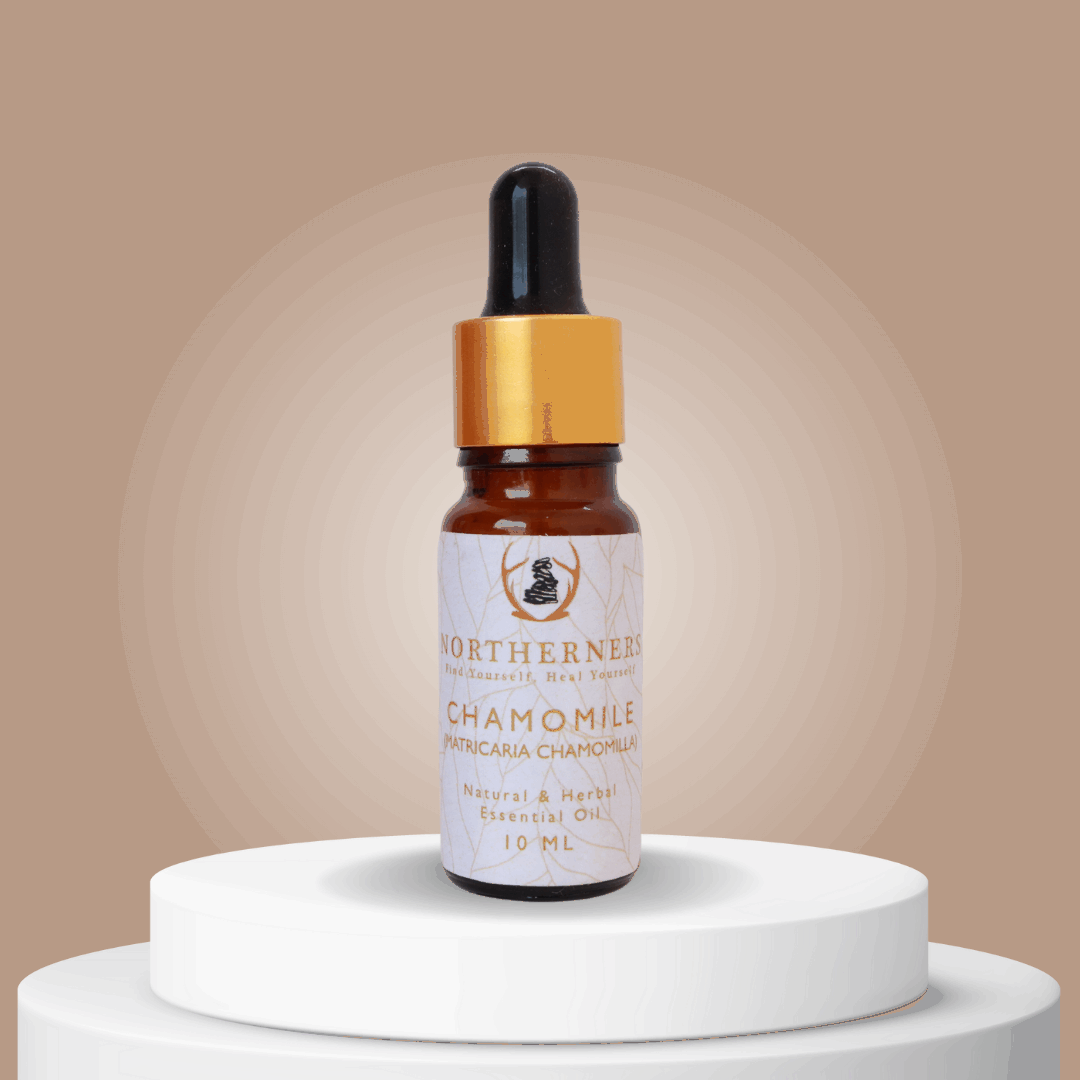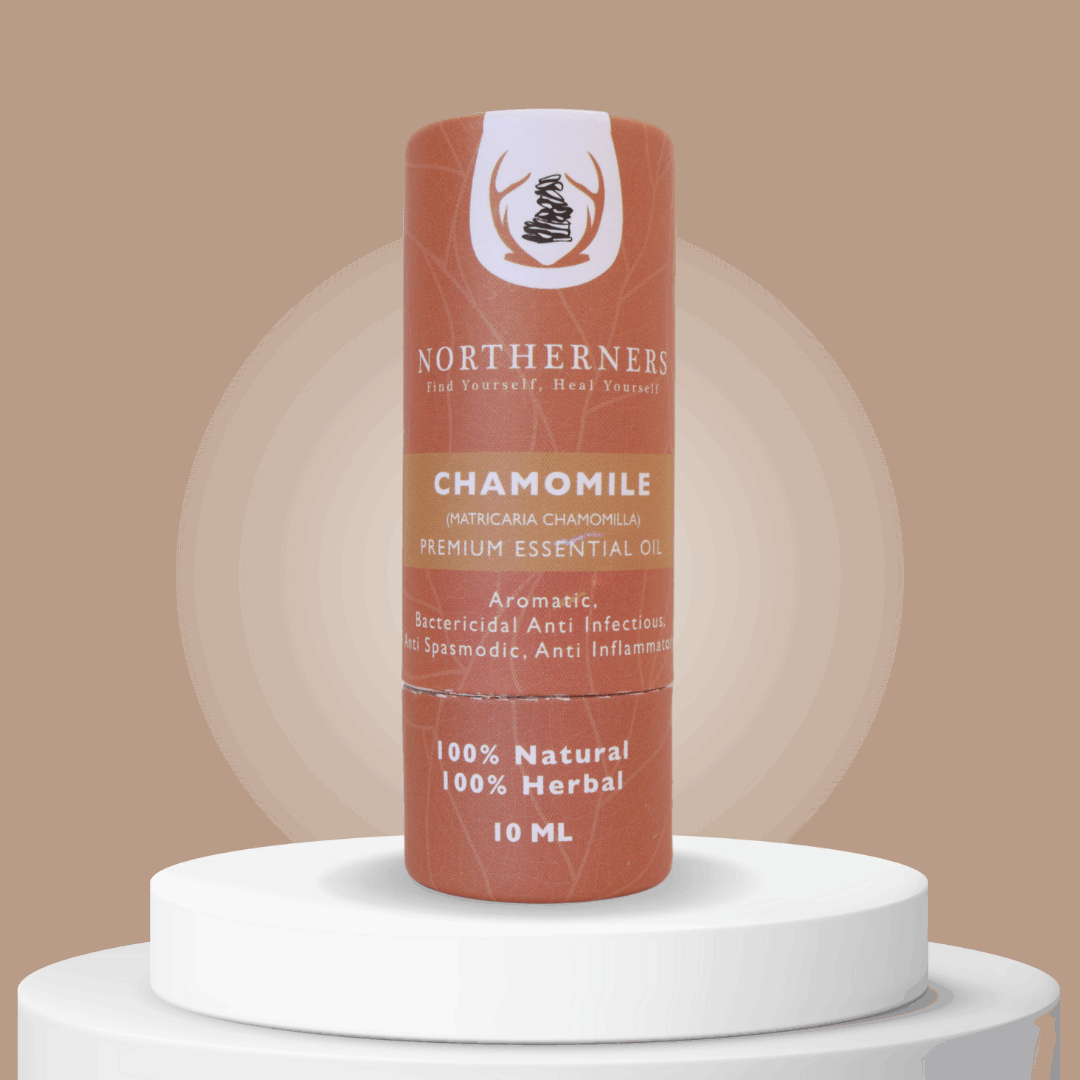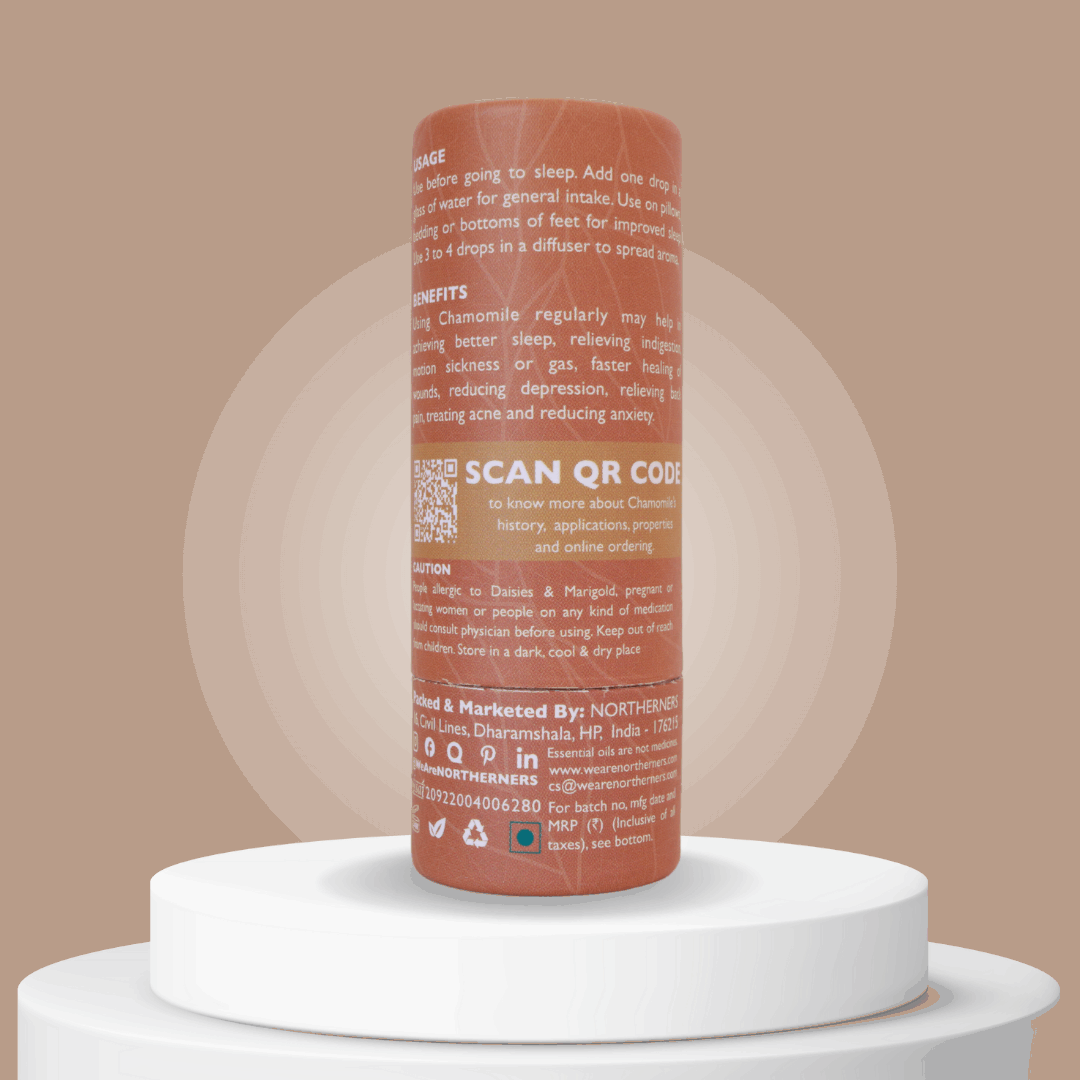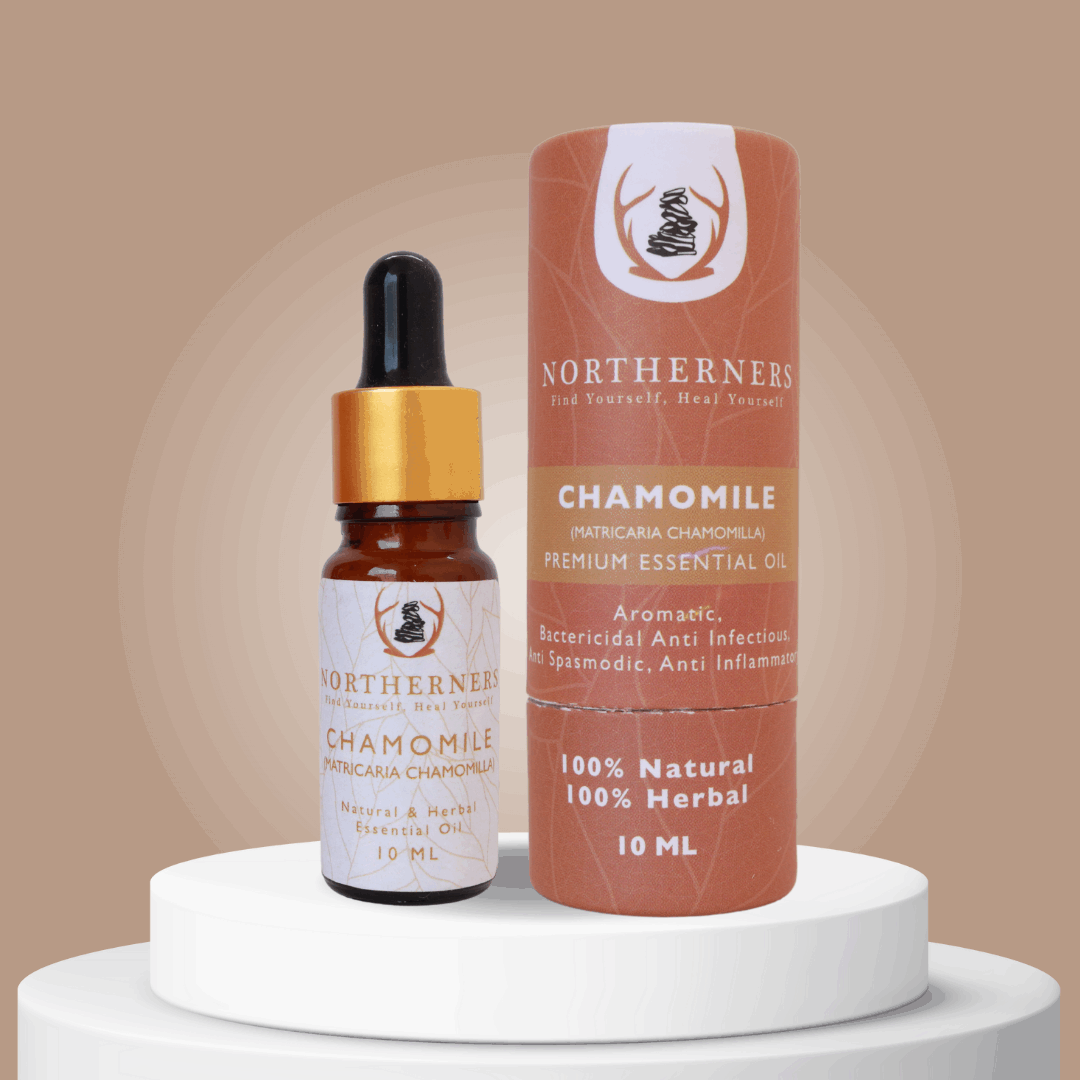Chamomile Essential Oil
Chamomile Essential Oil
Embrace the calming aroma of Northerners Chamomile Essential Oil, promoting relaxation and restful sleep. Ideal for diffusing or massage, it nurtures emotional well-being and invites tranquility into your life.
Couldn't load pickup availability
Learn More
Learn More
Experience the gentle and soothing qualities of Northerners Chamomile Essential Oil. With its delicate floral aroma, this oil brings a sense of calmness and relaxation to your surroundings. Let the comforting scent of chamomile envelop you, promoting a peaceful ambiance and restful sleep. Known for its soothing properties, it can help ease tension and support emotional well-being. Add a few drops to your diffuser or mix it with a carrier oil for a soothing massage. Embrace the nurturing power of Northerners Chamomile Essential Oil and invite moments of tranquility and rejuvenation into your life.
Share




Know More About Chamomile Essential Oil
Usage
- Aromatherapy: Add a few drops of chamomile oil to a diffuser or oil burner filled with water. Diffuse the oil throughout your space to create a calming and relaxing atmosphere. Inhaling the aroma can help promote a sense of tranquility and ease stress.
- Topical Application: Dilute chamomile essential oil with a suitable carrier oil, such as coconut oil or sweet almond oil, before applying it to the skin. This oil can be used for massage, targeting specific areas of tension or discomfort. It can also be used in skincare routines to soothe and moisturize the skin.
- Bathing: Add a few drops of chamomile oil to warm bathwater for a soothing and relaxing bath. The aromatic steam will help create a calming experience and promote relaxation.
- Inhalation: For quick relief, you can inhale chamomile oil directly from the bottle or by placing a few drops on a tissue or handkerchief. Take deep breaths to enjoy its calming and stress-relieving effects.
- Skincare: Chamomile oil is gentle and known for its skin-soothing properties. You can add a few drops to your facial cleanser, moisturizer, or body lotion to help calm and nourish the skin. It may help with skin irritations, redness, and inflammation.
- Hair Care: Chamomile oil can be used to enhance hair health and promote shine. You can add a few drops to your shampoo or conditioner or create a hair rinse by adding it to a cup of water and rinsing your hair with it after shampooing.
- Calming Tea: You can add a drop or two of chamomile oil to your favorite herbal tea blend to enhance its soothing properties. Chamomile tea, either infused with chamomile flowers or with a drop of chamomile oil, is known for its calming and sleep-promoting effects.
Potential Health Benefits
- Relaxation and Sleep: Chamomile oil is well-known for its calming effects on the mind and body. It can help reduce stress, anxiety, and promote relaxation, making it beneficial for improving sleep quality and treating insomnia.
- Soothes Skin Irritation: Chamomile essential oil has anti-inflammatory and gentle antiseptic properties, which make it effective for soothing various skin irritations. It can help alleviate itching, redness, and inflammation caused by conditions like eczema, dermatitis, and psoriasis.
- Promotes Digestive Health: Chamomile oil has been used for centuries to aid in digestive issues. It can help calm an upset stomach, relieve bloating and gas, and support healthy digestion. Chamomile tea, infused with chamomile essential oil, is often consumed for its digestive benefits.
- Eases Muscle Discomfort: The soothing properties of chamomile oil make it beneficial for easing muscle discomfort and tension. Massaging diluted chamomile oil onto sore muscles can help relax and relieve muscle aches and cramps.
- Relieves Menstrual Symptoms: Chamomile oil may help alleviate menstrual symptoms such as menstrual cramps, bloating, and mood swings. Its calming properties can help relax the muscles and ease discomfort during this time.
- Skin Care: Chamomile essential oil is commonly used in skincare products due to its gentle nature and ability to soothe and nourish the skin. It can help reduce inflammation, redness, and irritation, making it suitable for sensitive skin types.
Natural Properties
- Calming and Relaxing: Chamomile essential oil is well-known for its calming and relaxing properties. It can help promote relaxation, reduce stress, and ease anxiety and nervous tension. It is often used in aromatherapy to create a peaceful and soothing atmosphere.
- Anti-inflammatory: Chamomile essential oil contains compounds such as alpha-bisabolol and chamazulene, which have anti-inflammatory properties. It can help reduce inflammation, soothe irritated skin, and alleviate various skin conditions like dermatitis and eczema.
- Analgesic: Chamomile essential oil possesses analgesic properties, making it useful for pain relief. It can help alleviate headaches, muscle aches, and menstrual cramps when applied topically or used in a massage.
- Antispasmodic: Chamomile essential oil has antispasmodic properties that help relax muscles and relieve muscle spasms. It can be beneficial for alleviating gastrointestinal issues, such as stomach cramps and indigestion.
- Antimicrobial: Chamomile essential oil exhibits antimicrobial properties, which can help inhibit the growth of bacteria and fungi. It may be used to cleanse wounds, soothe skin irritations, and prevent infections.
- Anti-allergenic: Chamomile essential oil has anti-allergenic properties that may help reduce allergic reactions and hypersensitivity. It can be beneficial for soothing allergic skin conditions like hives and rashes.
Precaution
- Allergic Reactions: Some individuals may have an allergic reaction to chamomile oil, especially if they have known allergies to plants in the daisy family, such as ragweed, chrysanthemums, or marigolds. It's recommended to perform a patch test before using chamomile oil topically and discontinue use if any signs of irritation or allergic reaction occur, such as redness, itching, or swelling.
- Skin Sensitization: Chamomile essential oil is generally considered non-irritating and safe for most skin types. However, in rare cases, it may cause skin sensitization or contact dermatitis. If you have sensitive skin, it's advisable to dilute chamomile oil properly before applying it topically and monitor your skin's reaction.
- Photosensitivity: Chamomile essential oil may cause photosensitivity in some individuals. This means that the skin may become more sensitive to sunlight, leading to an increased risk of sunburn or skin damage. It's recommended to avoid direct sunlight or UV exposure for at least 12 hours after applying chamomile oil topically.
- Pregnancy and Breastfeeding: While chamomile tea is commonly consumed during pregnancy, chamomile essential oil should be used with caution. There is limited research on the safety of chamomile oil during pregnancy and breastfeeding. It's best to consult with a healthcare professional before using chamomile oil during these periods.
- Drug Interactions: Chamomile essential oil may interact with certain medications, such as anticoagulants (blood thinners), sedatives, and drugs metabolized by the liver. If you are taking any medications, it's advisable to consult with a healthcare professional before using chamomile oil to avoid potential interactions.
- Oral Consumption: Chamomile essential oil should not be ingested unless under the guidance of a qualified healthcare professional or aromatherapist. Ingesting essential oils without proper knowledge and guidance can be potentially harmful.
- Children and Infants: Chamomile essential oil should be used with caution on children and infants. It's recommended to consult with a pediatrician or a qualified healthcare professional before using chamomile oil on young children.




